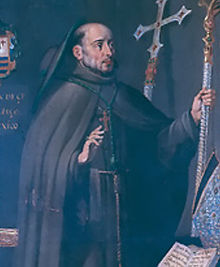Juan de Zumárraga
|
His Excellency Don Juan de Zumárraga O.F.M. |
|
|---|---|
| Bishop of Mexico | |
 |
|
| Province | Mexico City |
| See | Mexico |
| Installed | August 20, 1530 |
| Term ended | June 3, 1548 |
| Predecessor | None |
| Successor | Alonso de Montúfar, O. P. |
| Orders | |
| Consecration | April 27, 1533 by Diego Ribera de Toledo |
| Personal details | |
| Born | 1468[?] Durango, Biscay, Spain |
| Died | June 3, 1548 (aged 79–80) Mexico City, New Spain (present-day Mexico) |
| Nationality |
|
| Denomination | Roman Catholic |
Don Juan de Zumárraga (1468 – June 3, 1548) was a Spanish Basque Franciscan prelate and first bishop of Mexico. He wrote Doctrina breve, the first book published in the Western hemisphere, printed in Tenochtitlan (Mexico City) in 1539.
Zumárraga was born in 1468 or 1469 of a noble family, in Durango in the Biscay province in Spain. He entered the Franciscan Order, and in 1527 was custodian of the convent of Abrojo. Shortly afterwards he was appointed one of the judges of the court for the examination of witches in the Basque province. From his writings it would appear that he looked upon witches merely as women possessed of hallucinations.
By this time more detailed accounts of the importance of the conquest of Hernán Cortés began to be received, and on December 20, 1527, Zumárraga was recommended by Charles V for the post of first bishop of Mexico. Without having been consecrated and with only the title of bishop-elect and Protector of the Indians, he, accompanied by Fray Andrés de Olmos, left Spain with the first civil officials, judges (oidores), towards the end of August 1528, and reached Mexico on December 6. Thirteen days after, two of these judges, Alonso de Parada and Diego Maldonado, men of years and experience, died. Their companions, Juan Ortiz de Matienzo and Diego Delgadillo, assumed their authority, which was also shared by Nuño de Guzmán, who had come from his territories in the Pánuco Valley. Their administration was one of the most disastrous epochs in New Spain and one of great difficulty for Zumárraga.
...
Wikipedia
